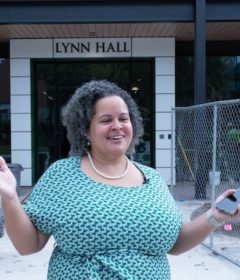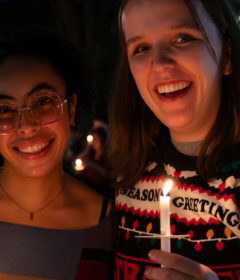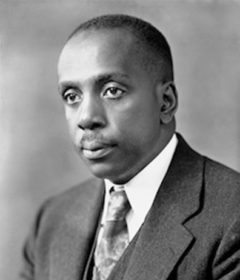Legal Eagles: Undergraduate Moot Court and Mock Trial Teams Rule
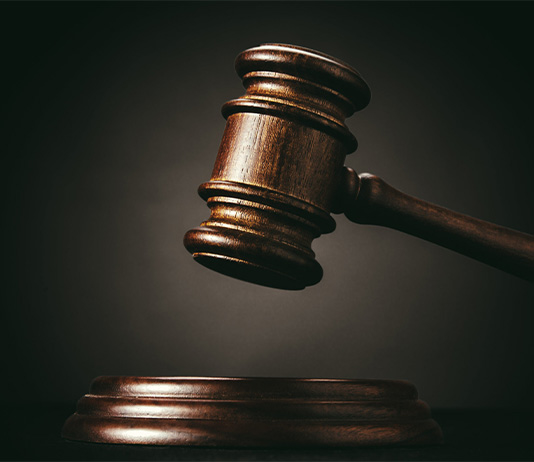

Recognizing this level of success is nothing to mock. And suggesting otherwise is a moot point. Indeed, there is no argument here, and the conclusion is clear. The verdict: The achievements of students in undergraduate Pre-Law are a big win for Stetson.
All word-plays aside, these truths will soon become self-evident.
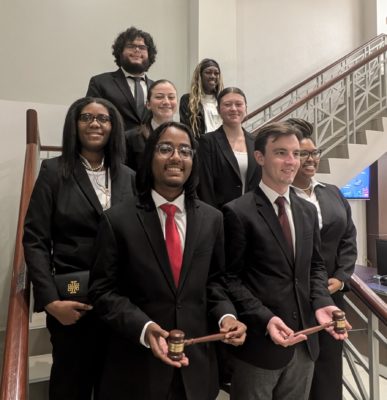
How’s this for success? On Oct. 26-27, four Stetson Moot Court teams, each consisting of two students, competed in the Sunshine State Regional against 28 other teams at Nova Southeastern University. The event was sponsored by the American Moot Court Association, the largest intercollegiate moot court organization nationwide. One of the Stetson teams advanced to the pre-nationals, with a second team barely missing out. In addition, three team members received outstanding orator awards, including first place (junior Stuart Rathbun), third place (junior Tristyn Rampersad) and 15th place (senior Layla Chong).
Team coach and mentor Andrew Langenbach, an attorney in DeLand, described the students’ performance as “incredible.”
“They are such a good group, and they have put in so much effort. I was really glad to see it pay off!” Langenbach commented.

That same weekend, Stetson’s Mock Trial Team of four students made history. At Florida International University in the Golden Panther Invitation, the team won its first-ever competition. Of 12 events, Stetson won 11. Also, first-year student Andrew Procell received an “outstanding witness” award, while senior Madyson Gennett, sophomore Temi Adediji and senior Anna Beal received “outstanding attorney” awards. The event was sponsored by the American Mock Trial Association, which serves as the governing body for intercollegiate mock trial competition.
A week later, speaking about the competition, Tejal Ram ’23, a former team member and now the coach, was still gushing. “I am so proud of their growth!” said Ram, who attends Stetson University College of Law. “I think we’ve come miles ahead of where the program was when I started [in 2021].”
Here are two more facts to put these feats into perspective: The Moot Court Team was established in fall 2022, and the Mock Trial Team was established in 2013. Many of the nation’s teams have existed for much longer.
Defining Terms
In basic form, Moot Court is a competition where students take part in simulated appellate advocacy, oral and written, before a tribunal of judges. Prior to the contest, the students develop their competence and ability to explain constitutional law, along with the precedent case-law developing it. At the competition, students are in pairs and work together in these small subgroups to construct detailed legal arguments for presentation before the court. As the students present, justices are allowed to interject at any point to test their competence in the controlling case law, both in understanding and articulation.
A Mock Trial is a competition in which students simulate a real trial. The trial will concern an official civil or criminal case that remains the same throughout the entire academic year. The case is entirely fictional, taking place in the fictional state of the Midlands. Teams consist of six to 10 members, but only six compete at any given time — three “attorneys” and three “witnesses.” The six students compete against six others from a different university. Teams must prepare both sides of the case (prosecution/plaintiff and defense) for every competition, which means any given person could have multiple positions on different sides of the case.
‘Scrappy and Tough’
In each setting, the students have committed themselves to excellence while competing against teams from bigger schools that enjoy well-established financial support, noted Joshua Rust, PhD, Philosophy professor and director of Stetson’s Pre-Law program.
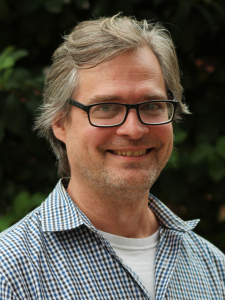
“Our teams are scrappy and tough,” Rust said. “These students are incredibly self-motivated. They love this stuff. And Mock Trial [in particular] is deeply baked into their sense of identity, especially the returning students.”
In turn, the students also are creating a new identity for Stetson on the DeLand campus. Historically, students at Stetson University College of Law in Gulfport have been dominant in national and international competitions. In 2023, for example, Stetson Law emerged as the only U.S. team to advance to one of the final rounds of the Willem C. Vis International Commercial Arbitration Moot in Vienna, Austria. However, this new success comes from undergraduates.
And the students aren’t law students, at least not yet. Instead, because there isn’t a Pre-Law major on campus, they come from diverse academic backgrounds, such as English, Philosophy and Political Science. “They’re drawing from different majors and bringing with them a diversity of perspectives, which I think is a strength,” Rust added.
Experiential Learning
Further, these students are meeting with and working alongside real-world professionals, including attorneys and judges, Rust cited. In other words, the students are personifying a new university initiative unveiled this fall, Hatter Ready, an innovative approach to specialized learning that enhances student engagement through immersive experiences.
Rust’s words: “This is a relationship-rich education that encourages connections between professors, students and community members outside the classroom. It is my firm conviction that what our Mock Trial and Moot Court students are doing is at the heart of what we want a Stetson education to be.
“If the Hatter Ready curriculum is the future of Stetson, then Mock Trial and Moot Court is the future of Stetson. What they’re doing needs to be what we’re all doing.”
Langenbach agreed, describing the competitions as “absolutely some of the best experiential learning you can have.”
Not coincidentally, there are ongoing conversations between Rust and Stetson Law Dean Benjamin Barros about increased collaboration. Stetson Law recently became a donor to the Moot and Mock teams. This is important because the teams depend on sponsorships and donations to sustain their success, Rust noted. “We could not facilitate this deep learning experience without the tremendous generosity of our sponsors, especially Butch and Mary Ann Paul, the title sponsor. And there is continued need as our teams’ success expands,” he said.
For the teams, by all accounts, this is a noteworthy start, perhaps even remarkable. Next up are more competitions early in 2025, in January for Moot Court and February for Mock Trial — with more chances to state their cases of excellence.
Editor’s note: Interested in helping the teams with financial support? Contact Pre-Law Director Joshua Rust, PhD, at [email protected].
-Michael Candelaria

